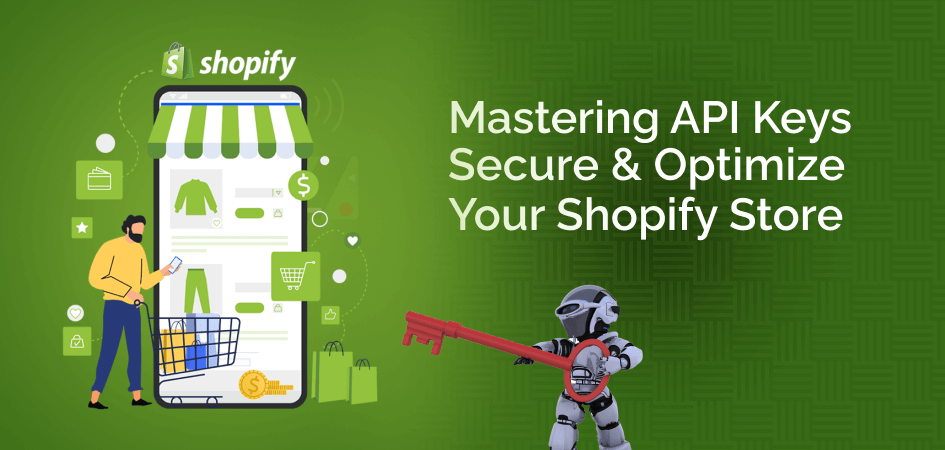
The API is the spine of modern digital systems. It connects different applications and allows them to share data and functions.
API keys are essential in maintaining the security and functionality of such systems. It acts as a digital pass where only authorized users and applications are granted access to use APIs.
This article is going to provide you with an idea of what API keys are and how they could be used in your Shopify store.
What Are API Keys?
API keys are unique codes assigned by an API service. These are used to identify and for security purposes. In other words, imagine them as a password which makes apps safe for talking to one another. Here’s an example:
1. Spotify uses API keys to let the apps play the songs in its library.
2. They embed maps into a website.
3. They never expose the data on a particular website without exposure to Google.
4. It acts as an app bridge.
5. An API key prevents an unauthorized person from crossing it.
How API Keys Work?
API keys work in a few steps. Let’s break them down.
1. Generation: An API provider will generate a unique key once you sign up with it. It connects your account.
2. Authentication: When you use the key, the API server checks whether it is valid. It is like showing your ID at a checkpoint.
3. Access Levels: Keys can have different permissions. Some allow you to view data, while others allow
4. Rate Limiting: APIs limit how often you can call them. That way, there is no overwhelming the system.
Real-life cases:
YouTube API keys are utilized for video embeds on any website. They all have differing permissions.Google’s APIs, for example, use rate limiting to avoid abuses and fair use.
API Keys Types
There are many different forms of API keys, which all depend on their usage and security requirements. Let’s cover the two types in greater detail:
Public API Keys
Public API keys are used for less sensitive use cases. They are commonly used in features that do not need much security.
1. Use Cases: Public API keys are more suited for any view of public information, such as embedding widgets or showing content. For instance, you can easily use a public API key on your Shopify website to show trendy products in lists.
2. Security Considerations: They are more accessible but risky. If the person finds your public key, it can be used against you. Always combine these with rate limiting and monitoring for reduced risk.
Private API Keys
Private API keys have increased security. This is due to the operations nature where there will be an involvement of private API keys, and sensitive data.
1. Use Cases: Ideal for managing payments, accessing information about customers or updating inventory, for example when your Shopify store integrates with the payment gateway stripe, it’s relying on a private API.
2. Improved Security: Many private keys have extra layers of protection. These include features like secret tokens and IP whitelisting that don’t allow unapproved access to your store and customer data.
Common Usage of API Keys
API keys have become a vital part of any Shopify store owner. They are required for integrating various apps and services. Some of the most common uses are listed below.
1. Access Control
API keys are gatekeepers. They ensure that only approved apps or users can access your APIs. For instance, your store’s API key might allow a third-party analytics tool to fetch sales data but prevent it from altering customer details.
2. Usage Tracking
API keys track how services are used. One can monitor the API requests and see which feature is the most popular. For instance, it could be the case that the API requests were for fetching product details, which indicates that customers appreciate detailed descriptions of products.
3. Blocking Unauthorized Traffic
API keys protect your store from unwanted traffic. You can identify and block someone trying to misuse your APIs. For example, a spam bot trying to overload your site will be stopped by your API’s security features.
4. Automating Integrations
One of the most compelling reasons for an API key is to enable automation. With private API keys, you can connect your Shopify shop to email marketing services, a stock management solution, or a client support application. This results in saving many hours and maximizing efficiency.
Real-Life Cases
1. Ecommerce: Connect third-party payment solutions such as Stripe or PayPal, using private keys. These payment solutions ensure complete security.
2. Analytics: Use tools like Google Analytics to gather customer behavior insights. API keys allow the seamless data transfer between your store and analytics platforms.
3. Customer Engagement: Sync customer data with email marketing tools like Mailchimp. API keys enable personalized campaigns and automated workflows.
4. Inventory Management: Connect with third-party systems to stock levels updated across multiple platforms. API keys make real-time synchronization possible.
Security Challenges and Risks
API keys are necessary, but they also pose risks. Here’s what you need to know:
Potential Threats
1. Key Leakage: Keys can be exposed in URLs, apps, or public code repositories.
2. Unauthorized Use: If stolen, keys can give hackers access to your data.
3. Data Breaches: Poor API management can lead to sensitive information leakage.
Real-Life Examples
Facebook API Breach: Poor security led to unauthorized access, affecting millions of users.
Twitter API Exploit: Public code exposed keys, which the attackers used to misuse APIs.
This knowledge will help keep your Shopify store safe from similar issues.
API Key Management Best Practices
You should keep your API keys safe. Here are the steps to follow for effective management:
Store Keys Securely
Use environment variables or encrypted storage to keep your keys hidden. Do not hard-code them into your app.
Limit Permissions
Only grant the minimum access required to complete a task. For instance, a payment API key does not need access to customer data.
Rotate Keys
Create new keys from time to time. This way, if a key is leaked, unauthorized access is prevented.
Monitor Usage Patterns
Track API activity to detect abnormal behaviour. For instance, an unexpected increase in API calls might indicate misuse.
Implement Rate Limiting
Set limits on how many times APIs can be called. This will prevent overuse and keep systems stable.
Use API Key Management Tools
Tools like AWS Secrets Manager or Postman make it easy to manage secure keys. They also help in monitoring and automation.
Educate Your Team
Ensure everyone handling API keys understands their importance. Share best practices and highlight risks.
Advanced Security Features
Sometimes, an API key is not enough. Here are other ways to secure your APIs :
OAuth Tokens:
These are safer than API keys. They are used for apps like Google or Facebook.
IP Whitelisting:
It grants access to a specific number of IP addresses. It is an added layer of security.
Encryption:
Encrypt data sent through APIs. This prevents hackers from intercepting the data.
Multi-Factor Authentication (MFA):
Adding MFA ensures that only verified users can access your API keys. It involves an extra verification step, such as a one-time password (OTP) or biometric scan.
Audit Logs
Monitor every action that has been performed regarding an API key. Audit logs may indicate unauthorized access or abnormal patterns.
Shopify Real-Life API Key Usage
API keys can transform the way your Shopify store functions. Let’s consider a few examples:
Inventory Management
Connect APIs with inventory management software to keep track of stock quantities on all channels. An API key can even hook your store into a warehouse management system.
Marketing campaigns
These will automate email marketing campaigns or analyze behaviour. Tools such as Mailchimp rely on an API key to tap into customer data and send appropriate emails at appropriate times.
Payment Gateways
Integrate payment options such as Stripe or PayPal securely using API keys. The same keys will then ensure safe transactions and real-time updates.
Analytics Tools
It has to hook your store to the Google Analytics API key. This kind of functionality will give insights into how users are behaving so that you can adapt to the right sales strategies.
Other Features to Stand Out
To make it easy to handle API keys, consider the following:
Interactive Examples
Widgets or demos containing API keys on how they would work. For instance, use an embedded Spotify playlist or Google Maps for demonstration purposes.
Step-by-Step Tutorial
Walk through how to create, validate, and manage API keys. Make sure to use screenshots from tools such as Postman to make it clearer.
Checklist or Infographic
Include a downloadable checklist of best practices so that users will remember the main points.
Tools That Make API Key Management Easier
Postman
Postman is a fantastic tool for testing and managing APIs. It will assist you in creating keys, testing endpoints, and monitoring usage.
AWS Secrets Manager
API keys are safely managed and stored by AWS Secrets Manager. It is a good solution for businesses working with sensitive data.
RapidAPI
RapidAPI offers an API marketplace. It makes API key management easier and helps you discover new tools for your Shopify store.
Apigee
Apigee, by Google, is a full-fledged API management and security platform that comes with tools for analytics, security, and rate limiting.
More E-commerce Use Cases
API keys can further enhance more sophisticated e-commerce functionality. Here’s how:
Customer Personalization
APIs can analyze customer preferences and make product recommendations. Integration with AI-based tools using API keys makes shopping more personalized.
Multi-Channel Integration
With API keys, Shopify stores can connect with marketplaces like Amazon or social media platforms. This guarantees uniform inventory and pricing on all channels.
Loyalty Programs
APIs may drive loyalty reward systems through tracking purchases by a customer. API keys guard against unauthorized communications between your store and the rewards system
Real-Time Shipping Updates
API keys allow shipping carriers’ integration. The customer will track the orders in real-time directly from your store without having to leave it.
Advanced Insights and Tips
API Key Integrate with AI Tools
To enhance the aspect of customer support and the process of managing your stores, it may be important to integrate your use of AI tools and API keys.
For instance, you could allow a ChatGPT, chatbot, to access some API keys when responding to direct queries from clients in real-time.
Also Read – Improve Customer Interactions with AI Chatbots
Adding Scalability through the Use of Keys
Through this, using APIs, and integrating multiple features with one key to help users scale and offer more value becomes easier.
Access to Support:
Connect to developer communities or forums, like Shopify Partners. Such forums contain the most precious tips and advice for solving the problem with API integration.
Conclusion
With an API key, your Shopify store is on and in use safely, hence the actual operational and securing applications. Information security is well kept as APIs interlink up apps, operate on auto-mode and guard sensitive details. Appropriate and further advanced protection measures should enhance maximum advantages drawn when implementing API keys but not threaten one’s own Shopify shop.
Effective management of API keys does not only add functionality to your store but inspires confidence in your customers since their data will be dealt with safely. Tools like Postman, AWS Secrets Manager, and Apigee make it easier to handle API integrations, and other advanced security measures include OAuth tokens, MFA, and IP whitelisting.
In short, this means keeping current, using the right tools, and monitoring the usage of APIs over time to unlock the complete potential for APIs and help set your Shopify store up for long-term success within the competitive arena of e-commerce. Start integrating and securing those API keys today to transform that store into something more dynamic, and customer-centric.

I bring a wealth of knowledge and experience to WillShall Consulting with two decades of expertise in Website Design, Development, and Digital Marketing, My journey has been marked by a passion for creating innovative web solutions that not only meet but exceed client expectations. As an avid analyst, I dedicate myself to understanding each customer’s unique needs, ensuring that our web solutions are not just functional but exceptional.





 Call Us
Call Us Email Us
Email Us Video Call
Video Call




